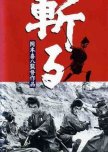
"Samurai aren't as great as you think"
“Kill!” was a 1968 film adapted from the same book Kurosawa Akira used for Sanjuro (1962). Just as with Sanjuro, “Kill!” had a hero who didn’t want to kill yet ended up having to take lives to save lives. The honor of the samurai was called into question as Genta, the itinerant ronin, found himself working to rescue a handful of loyal samurai from a corrupt system. With his wild eyes and hair, Nakadai Tatsuya perfectly played the humorous yet lethal swordsman.Tabata is a farmer who sold his land to buy samurai swords and is in town seeking a yakuza family that is hiring swordsmen. More than anything he wants to be a samurai. Well, almost anything. He hasn’t eaten in five days when he arrives in a town nearly destroyed by a recent revolt. Tabata meets another hungry ronin named Genta, as they both eye a scrawny chicken that would have made Moana’s Heihei* proud. In town are seven dedicated samurai who kill a corrupt official that has stepped out of line with their lord. The local chamberlain, Ayuzawa Tamiya, gave his tacit agreement for the assassination. Tabata goes to work for Ayuzawa while Genta sees a plot that may cost the seven loyal samurai their lives and begins to covertly work on a way to extricate them from the trap they have fallen into.
The first 30 minutes of the film felt needlessly complicated, though I suppose when introducing two dozen characters it was inevitable for there to be confusion. Nakadai Tatsuya played Genta, the wandering ronin who gave up being a samurai two years prior. Quick witted and quick with a sword, it was hard not to like Genta, especially as played by Nakadai. I have come to truly appreciate his wild eyes and cocksure smile. He looked like he was having great fun playing the skilled samurai masquerading as a vagrant. Takahashi Etsushi’s Tabata had a heart and physical strength greater than his brain power. Though not the sharpest katana in a battle, he made up for his lack in enthusiasm. The two unkempt swordsmen would find themselves on opposite sides but never truly enemies.
“Kill!” had numerous humorous moments yet never more than dipped its toe into slapstick. Other samurai films were alluded to without diving into parody. The samurai fell into “the good guys,”“the bad guys,” and “the average guys,” who were just trying to make a living. Swords, arrows, and bullets didn’t care which category the men belonged to and there was one death that particularly hurt. “Kill!” had several narrative issues, but I enjoyed it based mostly on Nakadai’s performance. The unlikely duo of farmer and reluctant samurai was entertaining as they attempted to save the “good guys" and “the average guys” all while trying to stay alive themselves. Once the film found its footing this chambara was entertaining. If you liked Yojimbo or Sanjuro, “Kill!” is one to try.
14 January 2025
*Spoiler---The chicken lives!
Vond je deze recentie nuttig?
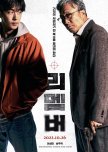
"One can't hide his true self even after his role has changed"
Time can’t erase some memories, memories seared deep into a person’s psyche. The kind of trauma that refuses to be healed. For Han Pil Ju who lost his family and more during the Japanese occupation, time could not take away his need for vengeance against the collaborators who prospered and were hailed as heroes in the years that followed.Han Pil Ju is working his last day at TGIF Fridays and it’s the last day he will be known as “Freddie” at the restaurant. He’s made a friend of In Gyu aka “Jason.” Freddie hires Jason to drive him around in an unregistered red Porsche sports car for important errands. It turns out that his errands involve killing the men who were responsible for the deaths of his family members. All of the men have prospered and hidden their traitorous pasts during the Japanese occupation. Jason gets pulled into Freddie’s revenge scheme as much as he would like to be free from it.
Fifty-three-year-old Lee Sung Min was extraordinary as the eighty-year-old with Alzheimer’s determined to clean the slate in his remaining days. How deep does a wound have to be for a man to hold on to vengeance for over 50 years? Pil Ju’s memory ebbed and flowed, yet he was still coherent enough to remember intricate details of his schemes. He avoided the Inigo Montoya trope, “You killed my father, prepare to die,” though at times was close to it. Nam Joo Hyuk gave In Gyu a naivete and ultimately solidarity with the old man. The two built a nice rapport with each other, something the success of the film hinged on.
Most of the targets were successful and wealthy enough that they couldn’t understand anyone not being able to let go of the past. “It’s illogical to talk about justice when one can’t protect his own family.” Blaming the victims for being beaten to death, dying from forced labor, or the consequences of being forced to be one of the comfort women was probably not the wisest course of action. They couldn’t see or didn’t care that their wealth and power were built on the blood of their own people they caused to be spilled.
Remember didn’t excuse Pil Ju’s actions any more than he did himself. What it did show was that there was still a national trauma that had not yet fully healed. As generations pass on, the memory may fade. “There is no future for people stuck in the past.” It was hard for Pil Ju to move on when justice had yet to be served and the individual tragedies had been dismissed. Remember kept the action moving, and at 2 hours felt tightly directed and well-acted. There were plot holes and using a bright red Porsche wasn’t the best getaway car, but it was an emotionally gripping film from start to finish.
9 January 2025
Vond je deze recentie nuttig?

"I will devour them for you"
Every once in a while, I need a wish fulfillment drama like Kurosagi aka The Black Swindler. Where much like in Leverage, capable people punish and stop swindlers and criminals who often evade prosecution. Kurosaki Koshiro had a strong need for revenge after the deaths of his family members due to a swindler and worked with a powerful man who may or may not have been his enemy to accomplish his goals.Kurosaki goes by many alias all beginning with Kuro. He is a Black Swindler who devours White Swindlers who prey on the vulnerable and fleece them of their money. He shares his take with Katsuragi, a sweet shop owner and launderer of illicit money. Katsuragi sells Kuro information on swindlers who are drawing the wrong kind of attention. In going after one white swindler, he meets a man much like his father who has lost everything. The man’s daughter, Tsurara, is vehemently against Kuro helping her dad. She is studying to become a lawyer so that one day she can be a prosecutor. Another fly in Kuro’s anointment is detective Kashina, who much like Tsurara is overly enthusiastic, judgmental, and living in a black and white world. Each time Kuro thinks he’s taken down the person who helped destroy his father, he finds a deeper level of swindling deceit.
I like to visit a world where there is someone who gives criminals their comeuppance. Not everyone in The Black Swindler felt the same way. Tsurara and Kashina seemed far more offended by Kuro who brought down swindlers than the actual swindlers themselves. Kashina who banged on about the need for law-and-order beat Kuro just for the heck of it at one time. Pretty sure assault on a citizen was a crime. Then he followed Kuro to Shanghai to prevent him from taking down a Big Bad and somehow managed to find Kuro on a remote street in a city of 25 million people. I have trouble finding my husband when we get separated in the grocery store! Also guessing China would frown on a foreign officer doing business clandestinely on their soil. Kashina and Tusrara with their shouting and breathless earnestness came close to spoiling my viewing experience. What made up for them were the more well written characters. Hirano Sho gave Kuro the emotional depth this single-minded character needed. Miura Tomokazu as the world weary and creative dessert chef Katsuragi was the perfect reluctant father figure and foe. I enjoyed every time Yamamoto Koji came on screen as the enigmatic and humorous Shiraishi. Nakamura Yuri’s character didn’t have much depth as Katsuragi’s assistant, but was skilled enough to take down the bad guys quietly and efficiently.
There were stand alone cases Kuro faced and those that tied back to the swindlers he was hunting. The cases were interesting and Kuro always got his man, even when he was a woman. The solutions may have been over simplified but I didn’t care, it was nice to see the schemers give Kuro a good meal as he devoured them and their ill-gotten gains.
8 January 2025
Vond je deze recentie nuttig?

"A heart that loves, never gets tired"
Homecoming was a part of the Jollibee’s Valentine 2018 series and a follow-up to its immensely popular short film/commercial Crush. Rather than a sequel, it filled out Crush’s story of young love that had a rocky start.Our nameless college student who delivered Jollibee hamburgers with encouraging notes to the female student he had a crush on in Crush, had to watch his love interest interacting with her boyfriend. As was hinted at in the first short, the boyfriend was very self-involved. The stalkerish good guy was always there to lend a hand or emotional support when she needed it. The beginning of the film showed they ended up together. The vignettes played out the progress of their relationship as she observed his generosity and tenacity.
I liked this short film/commercial better as it showed his actions that won her over and not just leaving her cold hamburgers with anonymous notes everywhere which I didn’t find particularly romantic. I won’t leave a drink unattended in a crowd, I’m certainly not going to eat a hamburger that appeared in my locker or on a bench. Here he stepped up to help her and was attentive to her needs. Jollibee was not forgotten after they became a couple. Even in old age she still loved Jollibee burgers and he was still Johnny on the spot to make sure she always had one on hand. The pragmatist in me wanted to mention she might need to have her cholesterol checked.
Homecoming was a cute follow-up to Crush that helped better explain how this couple based on a real story found their way to each other through a devotion to Jollibee burgers. Homecoming felt less contrived with a less problematic approach to romance than the first short film. As always, beauty and true love are in the eye of the beholder.
22 December 2024
Vond je deze recentie nuttig?
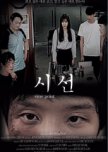
When a smiling distraught man approaches a woman, she assumes he has something nefarious in mind as does a male witness. As does the police officer who questions everyone except the wounded man. When Haneul, the wounded man, finally breaks down and gets their attention the story comes tumbling out.
In this world there are many biases that cloud our vision and interpretation of events. Every experience is sifted through cultural and social prejudices and norms often to the detriment of marginalized people. The Viewpoint showed the weakness of eye witness accounts and the harm caused by assumptions. A short and powerful reminder to open our minds to those we feel are “different” from us.
15 December 2024
Vond je deze recentie nuttig?

Like a rolling stone
Full disclosure, after watching this two-minute film I had to scurry across the internet and look up what sailing stones were. After doing my due diligence, I went back and rewatched Sailing Stones. I came to the conclusion that this was more a video piece of art than traditional film.Sailing Stones was filmed in black and white with zero dialogue. Several expressionless people are on the beach with long narrow tracks behind them. Their ages and sex vary. All stare ahead even as the sound of stone against stone grinds and moves them forward. At long last the sun begins to wake behind the mountain.
For anyone like me who is confused by the title, sailing stones (also sliding, walking, or rolling stones) have been found in Death Valley, California, USA. For a long time, stones were found to have moved with a dragging trail behind them. Turns out when the stones are on a melting sheet of ice, the strong winds can cause them to “sail.”
The disparate people in this short film were propelled in curving trails, victims of external forces instead of their own will and volition. Filmed for 10 CM’s single, “Sleepless in Seoul,” each of the individuals had their own reason for sleeplessness. A pregnant woman, a student, a salaryman, all were pushed about by the ever-present wind. Was the ground frozen beneath their feet or were their hearts and lives frozen as they were dispassionately transported?
I suspect like viewing a painting or a Rorschach test, everyone will have their own interpretation of this short film. I found the concept intriguing.
11 December 2024
Vond je deze recentie nuttig?
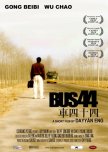
A bus ride you will not forget
Many of the short films I’ve watched have been heartwarming, life affirming, or poignant. Bus 44 blew those sentiments up in 11 minutes of dismal human nature with a series of shock and awe.Bus 44 travels through a rural area of idyllic lined trees and farm lands. The female bus driver stops for a young man who innocently flirts with her. At the next stop, two men enter the bus with evil on their minds. They rob the bus and make a decision that will prove fateful for everyone.
Director Dayyan Eng squeezed every minute out of this film imbuing the two leads with enough emotions to make them feel real. He managed to hit the Goldilocks Effect with the film not running too short nor too long. Without a whit of compassion, he also demonstrated the dire consequences of the Bystander Effect.
Bus 44 was short, horrifying, and satisfying in a grisly and perverse way. If you are looking for a feel good film, this is not it. Bus 44 showed the dark side of criminal behavior and group passivity. This well made film earned the film festival awards it won.
10 December 2024
***Spoilery trigger warning listed below***
Trigger warning: It’s listed as a spoiler in the tags, but for some people this needs to be more prominently displayed-Rape
Vond je deze recentie nuttig?
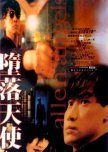
"The night is full of weirdos"
Fallen Angels was the film negative of Chungking Express. Both films dealt with lonely, disaffected people but Fallen Angels didn’t even pretend the characters had a shot at true love. Instead of police officers there were murderers and a slightly mad entrepreneur. Wong Kar Wai brought back the devastating canned pineapple and expiration dates, only this time the expiration dates were for relationships and lifespans.“I’m a lazy person, I like for people to arrange things for me.”
Wong Chi Ming is a hired killer. He calls himself lazy and enjoys having someone else tell him where to be and what to do. After finishing a job, he grabs a bus just like any other salary worker. When an old classmate on the bus asks about his life, he drags out pics and a story created for just such encounters. His partner, whom he never interacts with, cleans his apartment and gives him his assignments. She fancies herself in love with him and he, her. Wong runs into an old lover he doesn’t recognize, hooking up with her for a time. He Qi Wu lost his voice as a child after eating expired canned pineapples. His father is the caretaker of the Chungking Mansions Hotel where the secretive partner lives as well. At night Qi Wu breaks into businesses and runs them for himself. Too often he forces his services on customers who end up paying him to leave them alone. Qi Wu becomes involved with a woman whose boyfriend dumped her to marry another woman. Too soon he discovers that pineapples aren’t the only things with expiration dates.
“There are some things you can’t escape.”
Wong Kar Wai utilized his iconic green, yellow, and red palette once again. The characters and backgrounds flew frenetically about, always in motion as if they were trying to outrun their fates. The characters’ sun was the moon as they lived in a world constantly at night, lit by streetlamps and neon lights echoed on damp pavements. Obsession and desire replaced anything resembling true love as they grasped at any form of connection to break their loneliness and isolation no matter how temporary. Chungking had one blonde in a wig, the Hong Kong of Fallen Angels was overpopulated with women and men named Blondie. These blondes didn’t have more fun, they were always on the precipice of loss or brawls.
“We rub elbows with a lot of people every day. Some of them might become your friends or confidants.”
The acting was superb whether in action scenes, comedic situations, or characters sorrowfully scouring bars and streets for a glance at love. There was little to no plot, this was Wong Kar Wai. Style and mood ruled over narrative. The characters weren’t highly developed more like notes in a song too sad for words, played out in garish, muted tones. There are times with WKW that I’m not sure if his work is bold or self-indulgent like a video collage of dark emotions set on fire. I enjoyed Fallen Angels more than Chungking Express though I did miss Tony Leung’s presence. This film’s mood hit with me, swaying the balance to a bold, creative effort.
“The road wasn’t that long and I knew I’d be getting off soon. But at that moment I felt such warmth.”
9 December 2024
Trigger warnings: Self-pleasuring scenes and bathroom humor. For vegans, butcher scenes.
Vond je deze recentie nuttig?
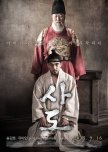
"In the royal household, they regard their children as enemies"
This was a hard film for me to write a review for. The Throne told the events leading up to the explosive event in 1762 when King Young Jo took his troublesome son’s punishment into his own hands. Or at least part of the events, giving reasons or making excuses for Crown Prince Sado’s reprehensible behavior depending on how you looked at it.Crown Prince Sado is called before his father after a possible aborted attempt to kill the king, something largely frowned upon. The king is in a jam because he can’t execute the prince for being a traitor because of the problematic law that states the whole family of a traitor would be judged, implicating the king and royal grandson as well. If the prince kills himself, his retainers and supporters are afraid they will be executed. Eventually, the king settles on locking the prince in a rice box with no food or water. The story then flips back and forth in time to explain how the two came to this moment of deadly impasse.
King Young Jo prided himself on his studies and discipline to Confucian ideals and decorum. Sado enjoyed art and hated studying. As the young prince grew up, the king became more disenchanted with the crown prince and more critical. When he made Sado a regent, Sado attempted to change taxation and create laws to benefit the people instead of the nobles. Rival factions were not amused and the king stepped in fearing a loss of power and prestige for himself. Regardless of what decisions Sado made, the king ridiculed him. And apparently because his daddy was mean to him, Sado snapped and became a murdering deviant.
In real life, Sado murdered a eunuch and carried the head around in his private quarters. He beat and raped the women in his circle and murdered many servants. Which came first, the chicken or the egg? The serial rapist/murderer behavior or a distant critical father? In the film the Queen Dowager, his wife, and other women seemed to care for him and dote on him so he wasn’t without attention and positive affirmation. It felt like the film was attempting to drum up sympathy for Sado, but I dare say all of the people he murdered and raped would not feel much compassion regardless of the reason for his brutal and inhuman behavior. Glossing over his vicious actions seemed to weigh the scales without all the facts.
The costumes, wigs, and sets were all beautiful and luxurious. The Throne excelled in the poignant performances by most of the actors including Song Kang Ho, Yoo Ah In, and Kim Hae Sook. Song showed how the king was strictly disciplined in his own life, having no leniency for Sado’s more lax behavior. He also portrayed the king as distraught by the actions he felt had to be done for the country and to spare his grandson. Yoo brought out the complexities of this screen prince who wasn’t in a hurry to be king and had his own ideas for the crown. The dissent into madness was believable. Kim played the pivotal role of the Dowager Queen who saw more good in her grandson than her son did.
If I hadn’t read about Sado’s unbearably cruel behavior, I would have rated this film higher. Somehow leaving out the details seemed disingenuous when assigning blame for his actions to the king’s critical conduct toward his son. If you can block all that out and enjoy the film for the quality acting and cinematography, it is a stunning film to watch.
4 December 2024
Vond je deze recentie nuttig?

Promises, promises...
I was drawn to The Promise because Nicholas Tse and Sanada Hiroyuki were in the cast. It sounded like a fairytale which also had possibilities. If the characters hadn’t been so shallowly drawn, the promise of an entertaining film might have been fulfilled.Qian Cheng is a starving child with a sick mother. After scavenging food from a battlefield, she is approached by a goddess who offers her a deal she can’t turn down. Qian Cheng can be wealthy and adored by men. The catch, there’s always a catch, she can never fall in love or she will lose her love. Years later during a battle, a slave named Kun Lun displays a propensity for running---fast. General Guang Ming knows talent when he sees it and makes Kun Lun his personal slave. Duke Wu Huan is determined to take over the kingdom and have a grown Qian Cheng for his own. The table is now set for a love square.
The whole premise of the story is that Kun Lun, Guang Ming, and Wu Huan were all obsessed with Qian Cheng. It had to be the spell, for while she was beautiful, she wasn’t charismatic. Qian Cheng fell deeply in love with the masked man who saved her and had no qualms about giving herself to her supposed savior despite never having seen his face. Instead of coming across as a seductress, she appeared vapid to me. I found it difficult to care about any of the characters or root for any of the possible love combinations. They all seemed fairly vacuous. Aside from Kun Lun being able to enter the Speed Force, they just weren’t that interesting. Sanada and Tse camped it up a little in their portrayals of foes and besotted men, though Wu had other reasons for his obsession.
The CGI and special effects were rudimentary at best. There were luxurious costumes, especially for the opposing armies. You would not miss Guang Ming’s men in their bright red armor. The wigs left a lot to be desired though.
I enjoyed the premise of The Promise, or rather, I wanted to enjoy the premise of the film. The one-dimensional characters were difficult to become invested in. I appreciated most of the performances, it would be hard to ignore Sanada Hiroyuki and Nicholas Tse. The sets, scenery, and costumes were beautiful even with the low grade CGI and occasional editing glitches. It just felt like the movie promised so much more.
2 December 2024
Vond je deze recentie nuttig?
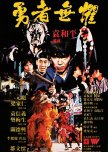
Laundry Kung Fu!
Dreadnaught was a martial arts film directed by Yuen Woo Ping. It starred Yuen Biao and a non-beardy “Beardy” Bryan Leung. In a supporting role was The Wong Fei Hung, Kwan Tak Hing, who’d played the character in at least 80 films. Most of the Yuen clan made a showing in this film or helped as martial arts directors.Mousy is a cowardly laundry man who is afraid of his own shadow and especially his sister. He is friends with Leung Foon, a student of the famous Wong Fei Hung. Across town is a rival of Wong’s, Tam King who is intent on bringing the physician down. The maniacal White Tiger is on the loose and Tam gives him shelter in his opera troupe. Mousy’s “lucky” bells trigger White Tiger’s deadly instincts sending the killer on the fearful washer’s tail.
Full disclosure, I’m not a big fan of slapstick comedy and Dreadnaught had its share. I found Mousy more annoying than endearing. If slapstick is your thing, you will likely enjoy this more than me. For a comedy it also had a rather high body count. With so many Yuens involved it couldn’t help but have creative and quality fights. The opening Lion dance and deadly dance off exhibited choreography requiring numerous skills. Yuen most likely to be cast as a deranged killer, Yuen Shun Yi, played the serial killer with frightening opera face paint. White Tiger seemed unable to speak only using growls to communicate. Yuen Biao was quite acrobatic and his latent laundry kung fu was interesting. Bryan Leung was excellent as Leung Foon who played for laughs and tears. Brandy Yuen and Yuen Cheung Yan both played assistants to the Marshall. This was my first time to see Kwan Tak Hing play Wong Fei Hung. At 76 most of his fights were choreographed using stunt doubles though he still held his own in several scenes. Rule of thumb with fight scenes on tv or movies. If you can’t see the face, it’s probably a double. Phillip Ko Fei made an appearance as bad guy Tam King. And Sai Gwa Pau who played Cocky So in Kwan’s movies also showed up here. Too bad they couldn’t get Walter Tso (Leung Foon) for a cameo.
Despite my dislike of Mousy’s over the top cowardice, I did enjoy this movie. Yuen Shun Yi made for a terrifying Big Bad, mainly because he had the skills to back it up. Yuen Biao and Bryan Leung’s kung fu abilities worked well with the fight choreography, making each fight entertaining. And it was fun to see elder statesman Wong Fei Hung, Kwan Tak Hing, have the chance to show he still had some moves left as he pushed eighty. This wasn’t the best Yuen Woo Ping film, but it was worth watching for the fight scenes. As always, I grade this old kung fu flicks on a curve.
30 November 2024
Dreadnaught: “One that is among the largest or most powerful of its kind.”
Vond je deze recentie nuttig?
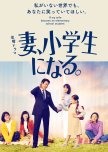
Tsuma, Shogakusei ni Naru
4 mensen vonden deze beoordeling nuttig
"Isn't life too long to live that way?"
If My Wife Becomes an Elementary Student was actually an off-putting title for me as I’ve had some odd experiences with Jdramas. One, I worried that this would be one of those age gap VERY inappropriate dramas or if it wasn’t illegally weird the child actor would be awful. Neither of those concerns were fulfilled. There was one little segment that was uncomfortable but mostly this was a very wholesome drama about healing after suffering from devastating grief. I know what it’s like to wonder if the sky will ever be blue again after the loss of a loved one. For the most part this drama handled it well. And most importantly, the young actress playing the elementary school child was amazing.Keisuke and his 20-year-old daughter Mai have become zombies after the death of his wife ten years prior. The are alive but not living. One day 10-year-old Marika arrives at their house and claims she is Takae reincarnated. At first neither believes her but before long the two fully accept her as their beloved wife/mother. Slowly but surely, the sunny, responsible Takae begins to work her magic on everyone involved. The only question, is she here to stay?
With the exception of the initial encounters with Marika and Keisuke acting like an idiot, the drama portrayed the healing powers of love and reconciliation in a meaningful way. Takae helped the people around her reconnect to life by showing them how to plug back in. Maida Nono played adult Takae quite believably and also 10-year-old Marika. The entire drama hinged on her performance and she carried the weight beautifully on her tiny shoulders.
The nagging drawbacks to me were the substantial age differences for characters and actors. I’ve no problem with most age gaps, but at the time 58-year-old Tsutsumi Shinichi and 26-year-old Morita Misato (32 year gap) was a bit of a stretch. They couldn’t have found a more age-appropriate actress? The potential romantic partner was barely older than the actress playing his daughter! Keisuke was described as kind, innocent, and clueless, but at his age some of his responses were over the top ridiculous, even for a man whose wife returned in the body of an elementary school child. Marika’s mother was no prize but the loss of her child was never dealt with in a consequential manner.
Overall, I enjoyed this drama quite a bit. Second chances in life are rare, impossibly rare when a loved one has passed. And when that loved one is the center of a family’s world and the sunshine in their lives, it can feel like life has ended when their life ended. Even as wish fulfillment, it was beautiful to see these wounded people granted the chance to heal and have their rear-ends kicked when needed in order to remember they were alive and needed to live to the fullest in order to honor that precious gift.
26 November 2024
Vond je deze recentie nuttig?

Nothing goes to waist in this short film!
I started this short film trepidatiously due to the title---My Wife Got Fat. Too often fat shaming is condoned and can be cruel and demoralizing. Thankfully, there was no judging or taunting here.When a wife wakes up to find she’s gained 2.2 kg/ 5 lbs she becomes frustrated that she’s gotten “fat.” Her husband doesn’t say much but begins to observe her. What he discovers touches him and he makes a plan.
Jang Young Nam played the anxious and loving wife and mother. It was hard for me to think of this slender woman as “fat.” I kept hoping her husband and sons would tell her how beautiful she was and to not be discouraged. Kim Tae Hoon brought a tenderness and understanding to the husband. Kim Joon as the youngest son is one of the most adorable child actors around. Fortunately, Ahn Ji Ho’s teenager wasn’t awful like so many teens are shown as being and was also enlisted to help the mom out. Throw in a cute dog and this family was about as perfect as they get. The resolution made the husband even more endearing.
With all of the dysfunctional families in Kdramas it was a joy to see a loving, supportive family. Though not even in my dreams could I aspire to be as “fat” as this thin mother. The mom was beautiful, active, and cared for her family and never should have felt less than. Apparently, not only beauty, but fat is in the eyes of the beholder. Thankfully, the beholder in this film saw his wife through the eyes of love.
21 November 2024
Vond je deze recentie nuttig?
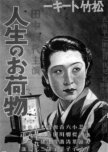
"Women are like products for sale"
Burden of Life was a short Gosho Heinosuke film from 1935. Not going to sugar coat this one. I hated it. Even taking into account the time period, it was so overtly sexist that it made my blood boil.There might be a couple of elements below that could be considered spoilery:
The film starts out safely enough (sort of) with a playful bantering of the sexes. Itsuko is the middle sister married to an artist who paints semi-nude portraits of her. They live beyond their means and rely on her parents helping them out with money. Oldest daughter Takako is married to Tetsuo and are always fighting. He disapproves of her buying anything for herself, yet he spends his time in hostess bars drinking and buying drinks for the hostesses. Machiko, the youngest daughter, is about to be married which is costing her dad more money. Nine-year-old Kanichi is the baby of the family. He stays away from his dad as much as possible, even eating dinner in the kitchen to avoid him. Shozo has nothing good to say about the boy. His mantra is, “We never should have had him.” Finally, the mother has had enough and begs the father to be kinder to him and plan for the son’s future as well.
I’ve watched numerous older films, but the gaslighting of the mom to prove that the father knew best and women were overly emotional was too much for me. There appeared to be a tiny softening of Shozo near the end but it was not nearly enough for me to accept any real character growth. I found the father’s attitude deeply disturbing. Shozo didn’t know Kanichi’s age and had no plans for the boy to be educated. He considered the boy too short and too ugly to ever be married. Surprisingly, this was one of the first times I’ve come across a father wanting to be rid of a son. Daughters were often lambasted as being useless, but sons always seemed to be coveted. Shozo’s domineering attitude toward his wife had me hoping she’d smother him with her pillow while he slept. He kept saying he wished Kanichi had never been born, being as brilliant as he was, surely he knew how babies were made, didn’t he?
Despite the age of the film and knowing attitudes have changed in the last nearly 100 years, I could not enjoy this film at all. Other early directors had a modicum of respect for their female characters and audience. A child being continually rejected by his father destroyed any enjoyment I might have had with this film otherwise. If you are a fan of Gosho or can tolerate bad parenting and dismissive attitudes for women, at 67 minutes it’s worth a try. I gave myself a day to think about it and try to rationalize the father/husband’s behaviors and the neighbors’ but am still mad. Given this was supposed to be a lighthearted slice of life, I don’t think that’s the response Gosho was trying to elicit.
17 November 2024
Vond je deze recentie nuttig?
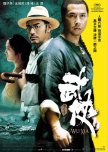
Homage to Jimmy Wang Yu's One-Armed Swordsman
Wu Xia aka Dragon was a nice homage to The One-Armed Swordsman, even casting Jimmy Wang Yu as the Big Bad. My review is based on the shorter international version which was thankfully subbed and not dubbed but was still almost 20 minutes shorter than the original version.Liu Ji Xi makes a living making paper and lives with his wife, stepson, and young son. Their lives are quiet and idyllic until one day two notorious criminals who have escaped custody break into a shop and brutalize the older couple who own it. Ji Xi clumsily stumbles in and intervenes. Afterward when the village is celebrating Ji Xi’s heroic acts, Detective Xu Bai Ju arrives. He believes that there may have been more than luck involved when the simple papermaker defeated too skilled killers. His suspicions are confirmed when the 72 Demons Gang attacks the town in search of Ji Xi.
Donnie Yen played the papermaker with a mysterious past giving the kind of performance you’d expect from him. He also choreographed the fights which meant they were entertaining to watch. Tang Wei played his wife, Ah Yu. Sadly, she didn’t have much to do in this film. Ji Xi’s bespectacled antagonist was the investigator played by Kaneshiro Takeshi who had his own murky past. I suspect some of the edits came at the cost of Kaneshiro’s character as there was more to him hinted at than what I saw. I would like to think Tang Wei’s time was also cut because in the 97-minute version she was criminally underused. Jimmy Wang Yu played the nefarious Master of the 72 Demons gang who was a formidable martial artist. I was never a fan of Jimmy’s old kung fu flicks, even blasphemously the original One-Armed Swordsman. To my relief, he gave a more nuanced, if menacing, performance here. Kara Hui (My Young Auntie!!) bounded in as one of the Demons and at 51 years of age held her own with Donnie in their choreographed fights.
Dragon had superb fights, two male leads with painful pasts trying to make the best of their lives, and a thriller element when the 72 Demons came to town with swords drawn. The film called into question whether there was room for empathy in enforcing the law. Dragon might not have broken any new ground, but it was stylishly filmed and well-acted. Not a bad way to spend an hour and a half.
7 November 2024
Trigger warnings: Body parts went flying in three different scenes as well as a tooth
Vond je deze recentie nuttig?

 55
55 223
223 11
11






















